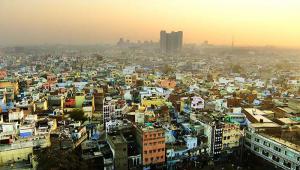By Judith Ugwumadu | 10 July 2014
India’s new government has published its first budget promising to cut the deficit to 4.1% this year and return annual growth rates to 8%, while an Expenditure Management Commission will comprehensively review public spending.
Narendra Modi, former governor of Gujurat and leader of the Hindu nationalist Bharatiya Janata party, won a landslide general election in May. Publishing the government’s budget today, Modi’s finance minister Arun Jaitley told the Parliament that India’s 1.2 billion people were ‘exasperated’ after two years of slow economic growth. Growth in India, the world’s tenth largest economy, has tailed off to 4.7% in recent years.
‘We look forward to lower levels of inflation as compared to the days of double-digit rates of food inflation in the last two years,’ he said, adding that India was in no mood to suffer unemployment, inadequate basic amenities, lack of infrastructure and apathetic governance.
The government intends to usher in policies that would bring in desired growth, lower inflation, sustained level of external sector balance and a prudent policy stance.
For this, he said the tax-to-GDP ratio must be improved and non-tax revenues increased.
The government plans to cut the fiscal deficit from 4.8% in 2012/13 to 4.1% in 2013/14 and to go on lowering it, something Jaitley said would be a ‘very difficult task’.
‘My road map for fiscal consolidation is a fiscal deficit of 3.6% for 2015/16 and 3% for 2016/17,’ he said.
‘We cannot leave behind a legacy of debt for our future generations. We cannot go on spending today which would be financed by taxation at a future date. There is an urgent need to generate more resources to fuel the economy.’
The government will also introduce an Expenditure Management Commission to look into every aspect of expenditure reform.
‘The commission will give its interim report within this financial year. I also propose to overhaul the subsidy regime, including food and petroleum subsidies, and make it more targeted while providing full protection to the marginalised and poor,’ he said.
The finance minister also confirmed that the government was committed to introducing a stable and predictable tax regime, which would be investor friendly and spur growth. As part of this, a good and services tax will be introduced to streamline tax administration and ensure higher revenue collection.
Jaitley also announced a range of infrastructure projects, including the development of metro railways in cities, new airports, while 8,500 km of roads will be built this financial year.
India’s Budget received a cautious welcome from Schroders’ emerging market economist Craig Botham.
He said: ‘The budget included a number of commitments to increase infrastructure spending and address bottlenecks in roads and ports, coal and mining… details are sketchy but given Prime Minister Modi’s record of dealing with red tape in Gujarat, we feel cautiously optimistic that promises to expeditiously resolve bureaucratic impasses can be met.
‘[Also], spending on subsidies is budgeted to fall by 0.3% of GDP, but there is no detail on how this will be achieved. Our concern here would be that if projections are not met, the deficit will be achieved through cuts to capital expenditure, as has often been the case in India.
‘India’s economy was never going to be reformed and revived by one budget alone, and we are encouraged that policy is going in the right direction. We hope now that Prime Minister Modi proves as adept at implementation on a national level as he did in Gujarat.’













